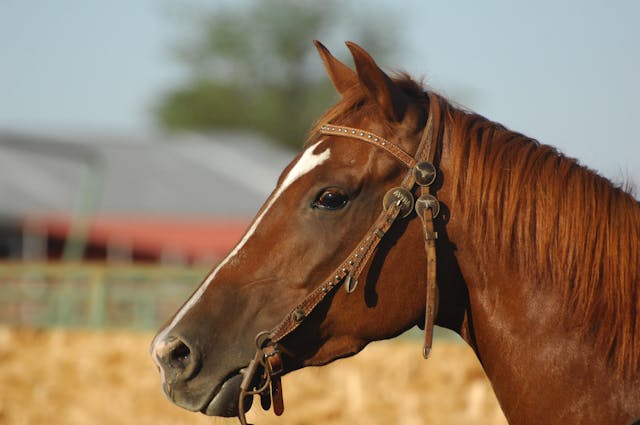Feeding Senior Horses: What You Need to Know

Understanding the Nutritional Needs of Senior Horses
Senior horses, generally considered to be 15 years and older, face a range of challenges that younger horses don’t. These include dental problems, reduced digestive efficiency, weight management issues, and increased vulnerability to conditions like Cushing's Disease (PPID). Their diet must be carefully managed to tackle these specific needs and support their overall health.
Key Considerations for Feeding Older Horses
Dental Health
As horses age, their teeth naturally wear down, which can make chewing fibrous feeds like hay a struggle. In more severe cases, missing teeth or oral health issues may prevent them from breaking down their feed at all. For these horses, softer, more digestible feeds are essential to ensure they’re still getting all the nutrients they need.
Digestive Efficiency
Older horses often experience a decline in digestive efficiency, making it harder for them to absorb vital nutrients. To help compensate for this, a diet rich in easily digestible nutrients—especially higher levels of protein and fat—can ensure they’re still getting the right balance for their age.
Weight Management
Maintaining a healthy weight in senior horses can be tricky. Some older horses may lose weight and condition, while others may struggle with obesity. It’s important to regularly monitor your horse’s weight and body condition and adjust their diet accordingly to keep them in good health.
Nutrient-Rich Diet
Older horses require a diet packed with vitamins and minerals to support their immune function and overall health. Calcium, phosphorus, and vitamin D are particularly important to maintain bone health, which can decline with age.
What Should I Feed My Senior Horse?
When deciding what to feed a senior horse, you need to focus on options that meet their unique nutritional requirements. Here’s a breakdown of what works best:
1. Senior Horse Feed
Specifically formulated for older horses, senior horse feeds are designed to cater to their changing dietary needs. These feeds often contain:
-
High Fibre Content: To promote digestion and support gut health, senior feeds are packed with easily digestible fibres like beet pulp and soybean hulls.
-
Added Fat: Many senior feeds include added fats, such as vegetable oil or rice bran, to help maintain body condition without over-relying on carbohydrates.
-
Higher Protein Levels: To support muscle maintenance and metabolism, senior feeds usually contain higher levels of quality protein.
-
Fortified with Vitamins and Minerals: Senior feeds are fortified with essential vitamins and minerals, including antioxidants, to support the immune system.
2. Forage Alternatives
For horses with significant dental issues, traditional hay might not be an option. Forage alternatives like hay cubes, pellets, or chopped forage can be soaked to create a soft, easy-to-chew meal that still provides necessary fibre and nutrients.
3. Supplements
Depending on your horse’s specific health needs, adding supplements can help maintain their condition. Common supplements for senior horses include:
-
Joint Supplements: Ingredients like glucosamine and chondroitin can help support joint health and mobility.
-
Probiotics and Prebiotics: These are great for promoting digestive health, particularly in horses that are prone to digestive issues.
-
Omega-3 Fatty Acids: To maintain a shiny coat and help reduce inflammation, omega-3 fatty acids are a valuable addition.
4. Balanced Rations
A well-balanced diet is key to supporting your senior horse’s overall health. Combining a senior feed with forage alternatives and supplements ensures all nutritional bases are covered. It’s also wise to consult with your vet to adjust your horse’s diet based on their individual needs.
Best Senior Horse Feed: What to Look For
Choosing the best senior horse feed involves looking for products that meet a few important criteria:
-
Quality Ingredients: Opt for feeds made from high-quality ingredients, avoiding those filled with unnecessary fillers or by-products.
-
Palatability: Older horses can become fussy eaters, so finding a feed that they enjoy is important for ensuring they get the nutrition they need.
-
Digestibility: Ensure the feed is easy to digest, especially if your horse struggles with dental issues or a sensitive digestive system.
-
Balanced Nutrition: Look for feeds that offer a balanced mix of protein, fats, fibre, and essential vitamins and minerals.
Practical Tips for Feeding Older Horses
Feeding older horses requires a careful, thoughtful approach. Here are some practical tips to help ensure they get the nutrition they need:
Regular Monitoring
Keep a close eye on your horse’s weight and body condition. This will help you adjust their feed as necessary and ensure they’re staying healthy. A regular body condition score (BCS) check is a useful tool in this regard.
Frequent, Small Meals
Senior horses benefit from being fed smaller, more frequent meals. This not only helps with digestion but also ensures they get a steady intake of nutrients throughout the day.
Hydration
As always, make sure your senior horse has constant access to fresh, clean water. Proper hydration is crucial for overall health and aids digestion, especially for older horses that might struggle with chewing or digesting dry feed.
Routine Veterinary Checks
Regular check-ups with your vet are essential for keeping your senior horse in top condition. Your vet can provide guidance on adjusting their diet and spot any health issues before they become serious.
Patience and Observation
Older horses can develop new eating habits or preferences as they age. Be patient and adapt their feed as necessary to ensure they’re comfortable and well-fed.
Feeding senior horses requires extra attention to their unique nutritional needs, but with the right approach, you can keep them healthy and happy well into their golden years. A tailored diet—whether that’s the best senior horse feed or carefully chosen supplements—can help maintain their weight, muscle mass, and overall health.
For more information on how to keep your horse in peak condition, explore some of our other articles at Equi-Box.
Posted on: 06/09/2024





